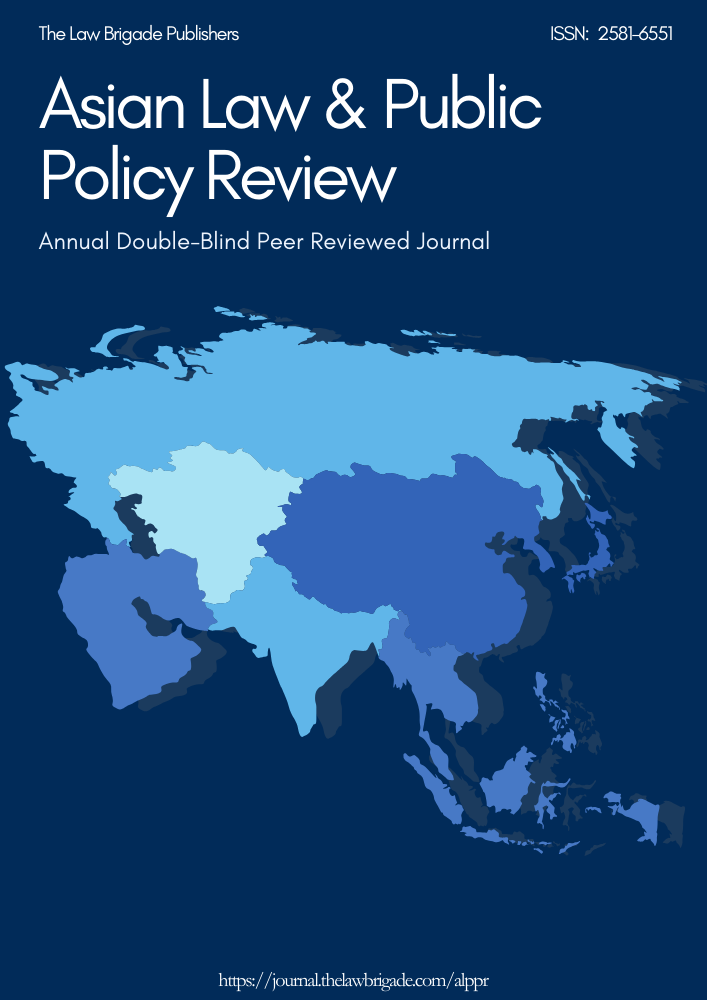The Critical Study of Legal Regime Governing Property Rights of Women – A Human Rights Perspective
Keywords:
Property rights, Human rights, WomenAbstract
In the history of humanity woman has been as important a factor as man, yet she was always looked down as an inferior creature. It is harsh reality that women have been ill- treated in every society for ages. The developments of a nation solely depend on the social status of women and women constitute almost one half of the globe’s population. However, women have been the victims of exploitations by male dominated society and continue to be exploited. But now it is required that women need to be empowered and men need to be oriented about their obligations towards women. Women are entitled to enjoy the same human rights and fundamental freedoms as other individuals. International human rights treaties require state parties to take proactive steps to ensure that women’s human rights are respected by law and to eliminate discrimination and practices that negatively affect women’s rights. The significance of gender equality in property is accepted not only from human rights point of view but it also important for every human development because now a day’s world move to ‘socialize’ and to achieve it the gender equality is necessary. It also includes women’s rights in access and control the property. Women’s property right is an important for her overall living conditions. The object of international human rights laws is to give a basic skeleton to each human being by the State which helps to achieve the object of it. The role of International Human right laws is to bring social reform for property rights of women and empower women which vary from country to country. Thus, women deprived her property rights due to gender inequalities in custom, religion and so on. The international human rights laws are important tools by which women empower themselves. International law as well as Domestic law used to protect rights and responsibility of citizens including women. The article examines the international Resolutions, treaties and Covenant that relate to women’s property rights. This article examines how the ‘women’s property right’ concern to other important international instruments with women’s human rights; in particular, the issue of equality in property.
Downloads
Downloads
Published
Issue
Section
License

This work is licensed under a Creative Commons Attribution-NonCommercial-ShareAlike 4.0 International License.
License Terms
Ownership and Licensing:
Authors of research papers submitted to any journal published by The Law Brigade Publishers retain the copyright of their work while granting the journal specific rights. Authors maintain ownership of the copyright and grant the journal the right of first publication. Simultaneously, authors agree to license their research papers under the Creative Commons Attribution-ShareAlike 4.0 International (CC BY-SA 4.0) License.
License Permissions:
Under the CC BY-SA 4.0 License, others are permitted to share and adapt the work, even for commercial purposes, provided that appropriate attribution is given to the authors, and acknowledgment is made of the initial publication by The Law Brigade Publishers. This license encourages the broad dissemination and reuse of research papers while ensuring that the original work is properly credited.
Additional Distribution Arrangements:
Authors are free to enter into separate, non-exclusive contractual arrangements for distributing the published version of the work (e.g., posting it to institutional repositories or publishing it in books), provided that the original publication by The Law Brigade Publishers is acknowledged.
Online Posting:
Authors are encouraged to share their work online (e.g., in institutional repositories or on personal websites) both prior to submission and after publication. This practice can facilitate productive exchanges and increase the visibility and citation of the work.
Responsibility and Liability:
Authors are responsible for ensuring that their submitted research papers do not infringe on the copyright, privacy, or other rights of third parties. The Law Brigade Publishers disclaims any liability for any copyright infringement or violation of third-party rights within the submitted research papers.


